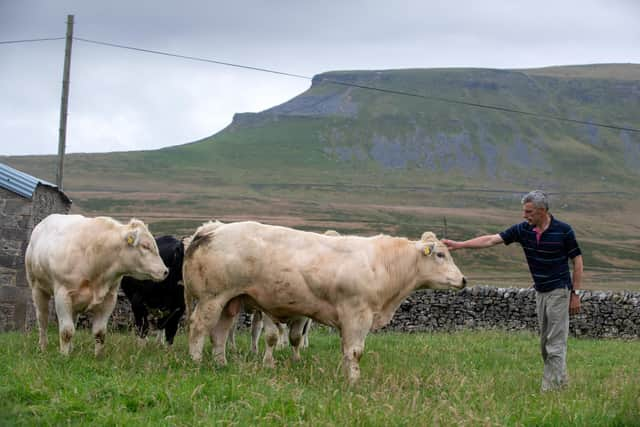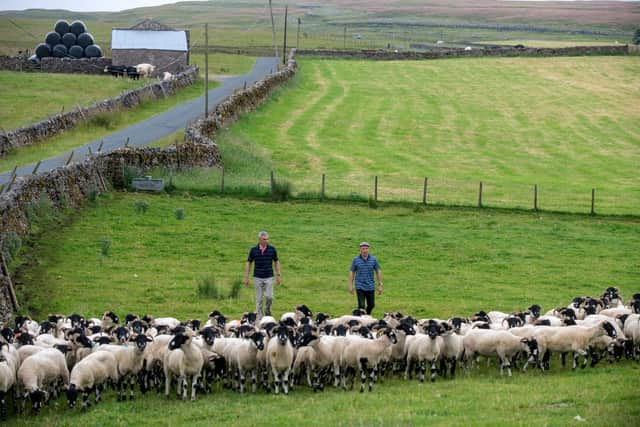Farm of the Week: Two brothers who work one of Yorkshire's highest farms in shadow of Pen-y-Ghent
Graham and Alan Coates farm at Rainscar on Pen-y-Ghent, where their farm is one of the highest in Yorkshire, running at between 1,400-2,200 feet above sea level. They have a pedigree herd of 30 British Blue breeding cows and a pedigree flock of 500 Dalesbred ewes.
Graham said that people are often surprised to hear or see that they have British Blues that high up.
Advertisement
Hide AdAdvertisement
Hide Ad“We are farming in the shadow of Pen-y-Ghent and people certainly don’t expect to see anything other than maybe Highlanders and sheep up this high. We used to have Galloway cows before our parents, Eric and Jane, took on what were then known as Belgian Blues 40 years ago just as the breed was being imported for the first time.


“Our Greystone herd has the number 28 and today the herdbook is near to 5,000 due to the breed’s popularity. We are also now the longest serving breeders.
“Dad needed a new bull and having read an article about the breed being the coming thing and, having seen one of the first imports at a farm in Lancashire, he put his name down for a bull and my mum’s name for a heifer for the next import in autumn 1982. Alan and I were boys at the time, but we both remember it well.
“We can still trace everything we have ever produced on the farm back to those initial two beasts.”
Advertisement
Hide AdAdvertisement
Hide AdIn commercial cattle breeding in the UK there is a huge proportion of farmers who are crossing with the British Blue or Limousin breeds to produce butchers’ beef. Graham said the breed has stood the test of time and that his and Alan’s market was predominantly providing the quality breeding stock end, both for bulls and heifers.


“They’ve stood the test of time because of what they are and what they do. They produce stock with excellent killing out percentages that the butchers are looking for.
“We have a good reputation for breeding bulls and bulling heifers to sell to other breeders at Carlisle and also in Skipton, and over the years we have also sold 25 bulls into the Genus stud. We buy in some bulls and we will use AI, but we will also use our own homebred bulls. It’s a very fluid arrangement. We put beasts to what we think will suit AI and chase up with the bull or we will just put to natural service. It’s a mix.
“Our record price we made is 18,000 guineas at Carlisle in May 2008 with our homebred bull Greystone Bonzer. The main British Blue sales are held there in January and May.
Advertisement
Hide AdAdvertisement
Hide Ad“We have spring and autumn calving and so we are currently putting stock into calf around now and around New Year for autumn. Our cattle normally go out in mid-May and dependent on the weather they are usually back in by mid-October. We feed them on silage and minerals, nothing fancy."
Graham said that as well as providing Genus with bulls and selling bulls and bulling heifers at pedigree sales in livestock markets he and Alan also have a very good private trade and that he has noticed an increased demand for heifers.
“I think other breeders have now got more of an eye on keeping replacement females and that means they are gearing up their herds with improved stock. There’s now a bit more demand for good quality heifers.”
Rainscar has been farmed by the Coates family since Graham and Alan’s grandfather John moved to the farm just short of 100 years ago and one breed that hasn’t changed on their 1,900-acre moorland in that time is their hardy Dalesbred flock.
Advertisement
Hide AdAdvertisement
Hide AdGraham said their Dalesbred gimmers and tups are always in demand and are sold mainly through Bentham livestock market.
“We have just over 500 breeding ewes that all go to the horned tup. We lamb from mid-April and we produce all of our own replacements, which is normally in the region of 200 a year. This past lambing we scanned them at 184 per cent, but it varies each year.
“What people like about the Dalesbred is that they are a lot bigger, heavier and stronger sheep because of how they have been bred and they are that way to withstand the conditions where the breed thrives. We breed them to provide something with a bit of power. Anything we don’t keep as replacements we sell as surplus gimmers to other breeders and we pick out the best of our Dalesbred ram lambs to sell in the Dalesbred tup sales at Bentham. Our best price for a tup at Bentham is £4,500.
“We also sell-on our three-crop ewes at Bentham and there have been some good sales of those in more recent times. A lot of that stock ends up going into the Ripon and Harrogate area.
Advertisement
Hide AdAdvertisement
Hide AdPart of this demand is that while Dalesbred lambs are also bred to go direct into the food chain the other market for Graham and Alan is those who are crossing the Dalesbred ewe with the Teeswater tup to produce Masham lambs."
Graham said the market for producing quality Mashams is on the up at present and that is good news for the Dalesbred. “Masham lambs are really good and they make good ewes. There’s been a bit of a fashion thing about the Mule overtaking the Masham for quite a few years but there is now a definite move towards the Masham once again and it was nice to see the Masham once again triumph at the Great Yorkshire Show. It’s all good news for us."
Graham and Alan farm along with their mum, they are continuing the farm in the way that it has been for the past 40 years since the Blues arrived and largely since their grandfather arrived. Graham said they have no plans to change what they do.
“Apart from buying an extra 100 acres just outside the village of Stainforth about 20-odd years ago the farm is the same as it ever was. We do everything ourselves. I’m more cow orientated and Alan’s more towards the sheep but we do most things together."
Comment Guidelines
National World encourages reader discussion on our stories. User feedback, insights and back-and-forth exchanges add a rich layer of context to reporting. Please review our Community Guidelines before commenting.
